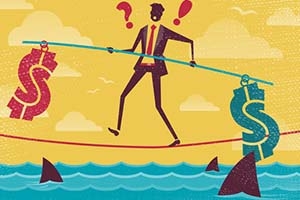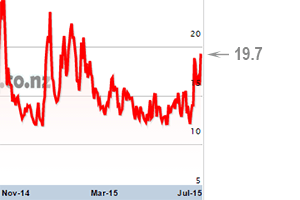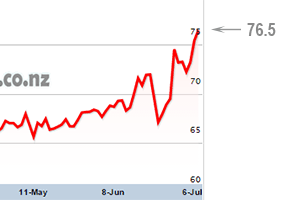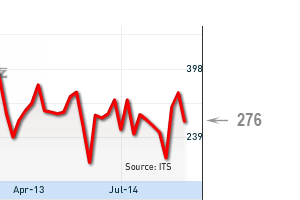
Financial stress is rising in the world's main economies.
We have a number of ways to track that, and track the impacts in our local economy.
Fear
Equity markets are places where investor concerns turn to fear early.
The CBOE Volatility Index or VIX as it is commonly referred to, is often seen as the best gauge of 'fear' and uncertainty in the market.
The Chicago Board Options Exchange (CBOE) developed the index which measures the near term (next 30 days) expected volatility of S&P 500 Index options trading.

During periods of financial stress, which are often accompanied by steep market declines, option prices and the VIX tend to rise. The greater the fear, the higher the VIX level.
As investor fear subsides, option prices tend to decline, which in turn causes VIX to decline.
Over the past week or so, this index has risen almost +60%. We monitor the index daily.
The cost of fear
Rapid equity price changes reflect the cost of fear. In bond markets, interest rate premiums for risk are measured by 'spreads'.
Markets track the chance of bond default by 'credit default swap' spreads.

We track those via three indexes for investment grade corporate debt - in the US, Europe, and Australasia.
We also keep an eye on sovereign CDS spreads. New Zealand sovereign spreads are currently about 30 bps. Overnight those for France widened sharply to 40 bps. For Spain they are at 130 bps, for Portugal they are now at 236 bps. (For Venezuela they are at almost 5000!)
Getting personal
Locally, a real-time measure of personal credit stress is the number of bankruptcy filings.
This is data supplied by the Insolvency & Trustee Service at MBIE.

Thay have declined back to pre-GFC levels, although there have been faint suggestions recently that bankruptcies and 'no asset procedure' filings may be moving up.
You can see these trends here.
This is a story in our Did you know? series. You can find them all here.
16 Comments
In respect of credit default swaps (CDS) and their under funded underwriters, I suggest reflecting upon the following.
The artificial suppression of default, in no small part to perceptions of those bank reserves under QE (just like perceptions of balance sheet capacity pre-crisis), has turned junk debt into the vehicle of choice for yet another cycle of “reach for yield.” The supply, this time, is far less of the eurodollar variety and more through mutual funds – less banking, more personal sector. Read more here and then here.
For some, the ordinary voters yes, "We shouldn’t wonder why people are working into their 70s–we should wonder why anyone retires, assuming they’ll still be receiving their full pension in five years"
http://davidstockmanscontracorner.com/no-jobs-for-the-young-no-retireme…
For many who made a living as a financial parasite they knew/know full well or should have.
I'm more concerned about the troglodytes located in Wellington, issuing forth with inane solutions without spending time out from behind their wellington-bound desks and getting their hands dirty - aaaagh, but, hang about Bill English and Gabriel Makhlouf are off to Beijing, again, and it is reported that a number of other desk-jockeys had sudden pressing business in Apia
The articles remind me of the famous quote.... "dazzle them with science or baffle them with bullshit".
.... ignorance is bliss
JK Galbraith said it in this way...."“Financial operations do not lend themselves to innovation. What is recurrently so described and celebrated is, without exception, a small variation on an established design . . . The world of finance hails the invention of the wheel over and over again, often in a slightly more unstable version.” "
Interesting you quote some rabid nutjobs, confirms much IMHO.
meanwhile,
"If you don’t believe financial markets are well and truly broken Monday’s tepid response to the Greferendum should be dispositive. The house of cards known as the Eurozone is about to hit the wall, unleashing financial contagion and turmoil far and wide. So any investor or trader in their right mind should have been slamming Jim Cramer’s triple sell button early and often."
http://davidstockmanscontracorner.com/first-was-a-head-fake-now-comes-e…
you don't lose until you sell, and if you panic sell you are pretty much guaranteed the maximum damage.
So if they're truly in trouble, they'll slowly bleed off the pressure (lock off interest, slowly recover debts piece by piece) rather than yank all the valves open and pray nothing else blows. Allow the hard debt to stand for others security in the others loans, so the market doesn't slow/stall.
The slow and steady *is* the sign of things going down.
I think the context is here that the gamblers and parasites will go from greed to fear and panic at some stage and sell aka 1929. When that happens mom, pops and pensions will be left holding worthless shares/paper/ etc ie broke.
In terms of panic sell if you get out early enough your losses are less than the late sellers or those who remain. Of course greed is ahead right now, except maybe in China, taht might be blowing up as we watch.
Interesting you quote some rabid nutjobs, confirms much IMHO.
The ad hominem attacks are unnecessary and serve you ill.
The world this man describes served me well and facilitated an extremely interesting experience along the way together with a more than generous early retirement scheme.
Here is a paragraph that I pulled out of an article on Dave stockmans website talking about the Chinese sharemarket, sounding a warning to those invested in bubbles...
"No bubble can remain aloft without a heavy dose of monetary inflation. The fact that China’s authorities, including its central bank, have been unable to stem the decline stands as a stark warning to the many Western investors who seemingly believe that central banks are nigh omnipotent entities run by magicians. This is not the case. Once an asset bubble begins to burst, there there is nothing central bankers can do to stop it – and we have plenty of bubbles awaiting their turn in the barrel."

We welcome your comments below. If you are not already registered, please register to comment.
Remember we welcome robust, respectful and insightful debate. We don't welcome abusive or defamatory comments and will de-register those repeatedly making such comments. Our current comment policy is here.